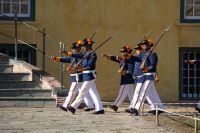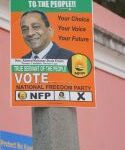May 6, 2019
School started today when we officially gathered the 30 faculty who are on this trip for what was our (so first day of schoolish) introduction to the teachers, each other, and the topic of the course. Professor Rolfe, our host from the University of South Carolina, spoke for about an hour and a half describing doing business in Africa (mostly sub Sahara Africa), covering as only he can, past and present, cultural and economic, and putting the economy and the election into perspective.
However, Carolyn and I had already spent our last “weekend” before school enjoying just being in Cape Town. I think the indulgence was deserved.
We arrived Saturday and that in itself was adventure (her bag arrived Sunday. Someone mistakenly took her black suitcase for hers; we took someone else’s black suitcase thinking it was hers—don’t ask). So we had a day and a half to exorcise our substantial jetlag. Even though my GPS says we’re “only” 8590 miles from Bloomington, it’s a loooong flight. 1 ½ hours to Atlanta; almost 9 hours to Amsterdam; and about 11 hours from Amsterdam to cover the almost 6500 miles to Cape Town.
Carolyn spent much of the flight (you can run out of films you want to see pretty easily, and peasant class is a tough one to sleep through) questioning my routing. “Why didn’t we go straight from Atlanta to Johannesburg? We’re flying home that route. Planes must go both ways.” Turns out THAT route is 18 hours, too, depending on headwinds, so there’s nothing to be gained. The Atlanta Johannesburg route, apparently, is the second longest in the world.
 But we got here, eventually, and had arranged a tour with my guide from four years ago, targeting some places I had not seen last trip—Table Mountain and Stellenbosch—together with some sampling of the famous vineyards of South Africa.
But we got here, eventually, and had arranged a tour with my guide from four years ago, targeting some places I had not seen last trip—Table Mountain and Stellenbosch—together with some sampling of the famous vineyards of South Africa.
Sunday, I had wanted to take the cable car up Table Mountain, but it was Sunday and mobbed; if we’d gotten into the lines, we’d probably still be waiting for the ride up. Table Mountain, which looks like a table (it’s  sandstone peak has eroded, and it is flat, marking
sandstone peak has eroded, and it is flat, marking Cape’s location as one of the most memorable physical locations for a city); alas, we contented ourselves with the view from the road, a trip to nearby Signal Hill (where Carolyn firmly said No Way to my plea to test paragliding), thence to the “Green belt” and the winelands around Cape Town.
Cape’s location as one of the most memorable physical locations for a city); alas, we contented ourselves with the view from the road, a trip to nearby Signal Hill (where Carolyn firmly said No Way to my plea to test paragliding), thence to the “Green belt” and the winelands around Cape Town.
Our guide has an interesting perspective on South Africa, being descended on her father’s side from the original 250 Huguenot (French Protestants) welcomed by the Dutch in the mid 17th century to help establish the colony as an agricultural way station on the route to the Indies. Grow crops and raise beef, and reprovision ships on the route, and you can settle in French town; even then, the Dutch (better known as the Boers) had thoughts about who belonged where. The Huguenots brought viniculture, and thus was born one of South Africa’s prominent exports. Though not being able to label bubbling wine “Champagne” –I learned that’s protected by the treaty of Versailles (since the US never signed it, Taylor can label its New York bubbly Champagne), the region produces world-class wines. One, pinotage, is a local contribution, grown from pinot noir and another variety, perfected by a professor (we’re not all theoreticians) in 1925, but not commercialized until the 1960’s, as well as a mix of mostly dry and some sweet wines. We hit three of the wineries, one for lunch, about two short of what is “recommended.” (Can you imagine the consequences of sampling 5 wines at four wineries?) We learned about the varieties—four of chardonnay for example, and why this area is so good for growing wines, and how different wines depend on process, weather, kind of wood, how long aged, shape of bottle—an education no doubt.
Our guide,who speaks Afrikaans, a simplified descendant of Dutch with no genders, which is one of the major languages in South Africa (there are 11 or so), told us about her family’s history during the Boer War. We know it primarily because of Baden-Powell, the general commanding British forces during the siege of Mafeking; as a result, he thought British boys needed to become more “manly” and started Scouting for Boys (resigning from the Army in disgust after World War I to turn scouting into a force for peace). Christelle’s “grannie” and her family were put in concentration camps (the Boers fought the British for nearly ten years in the second Boer War). She said they survived because her aunt was a nurse who was able to get extra food rations.
For South Africa, the result of the war was the peace among the whites that led to the formation of the Union of South Africa in 1911.
The other discussion in the winelands had to do with the important issue in the “biggest election in South Africa’s history”—land reform, since the vineyards are large plots of land in a country where 73% of the land is still owned by whites. One of the 3 parties, a new populist  spinoff from the ruling (since Independence in 1994) African National Congress has introduced a “land seizure without compensation” amendment to the current constitution. The political situation is quite complex, since the parties list their candidates (all 400 apparently, in order of preference) and the election is based on the number of votes for the party. If you poll 60% of the vote, you get 240 seats in Parliament. And the party votes for the chief officer. The theory is that everyone gets represented. It will be an interesting time to be here. We’re doing a tour on Wednesday, partly since most businesses will be closed in this national holiday.
spinoff from the ruling (since Independence in 1994) African National Congress has introduced a “land seizure without compensation” amendment to the current constitution. The political situation is quite complex, since the parties list their candidates (all 400 apparently, in order of preference) and the election is based on the number of votes for the party. If you poll 60% of the vote, you get 240 seats in Parliament. And the party votes for the chief officer. The theory is that everyone gets represented. It will be an interesting time to be here. We’re doing a tour on Wednesday, partly since most businesses will be closed in this national holiday.